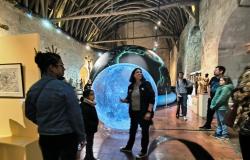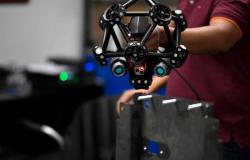It is on everyone’s lips and on many tables, a promise of health and longevity, representative of an active and community lifestyle, under warm and sunny auspices.
The Mediterranean diet – or Mediterranean diet – has been included on UNESCO’s list of intangible heritage since 2010. It is a guarantee of cultural value, but it is also a powerful strategic tool for promoting food products, for example olive oil.
Often mentioned for its health benefits, the Mediterranean diet was described for the first time in 1953 in a book dedicated to Crete. We were then surprised at the low incidence of cardiovascular diseases among the inhabitants of the Greek island, compared to Northern Europeans.
This diet, based on olive oil, invites, among other things, the consumption of fresh foods, seasonal fruits and vegetables and whole grains. It embodies the essence of the Mediterranean lifestyle. According to the UNESCO definition:
It involves a set of know-how, knowledge, rituals, symbolisms and traditions which concern crops, harvests, gathering, fishing, breeding, conservation, transformation, cooking and, very particularly , the way of sharing the table and consuming food. Eating together constitutes the foundation of the cultural identity and continuity of communities in the Mediterranean basin. It is a moment of social exchange and communication, of affirmation and rebuilding of the identity of the family, group or community.
(Shutterstock)
But beyond its impacts on our health, what does the Mediterranean diet tell us about ourselves, as a society? What is it a symptom of?
Postdoctoral researcher at the School of Management Sciences at UQAM, my research is at the intersection of heritage and tourism studies, food and mental health.
In 2021, I notably carried out field research, in Cilento (Italy), in Soria (Spain) and in Marseille (France), where I questioned the inhabitants’ attachment to the Mediterranean diet. I listened to their stories and then traced the web of local and social dynamics at the heart of the concept of the Mediterranean diet.
Also read: The Mediterranean diet improves intestinal health and helps you age better
The mirror of a deep societal crisis
The concept of the Mediterranean diet thus refers to a lifestyle that strengthens social relationships and is good for health. It all seems very simple and coherent.
However, the society in which we live makes it difficult to satisfy these basic needs. These health and social dimensions are extremely sought after, because they constitute the basis of a balance which is lacking in globalized societies.
Claude Fischler, sociologist of human nutrition, describes the multidimensional crisis of the food system plaguing modern societies.
According to him, a psychopathology of daily eating is underway. It would be characterized “by appetite disturbances, bulimic outbursts, anxious or compulsive snacking, etc.” Just think of the consumption of ultra-processed foods or prepared and frozen meals, eaten alone in front of the TV in the evening or in front of the computer during the dinner break.
(Author)
In this psychopathological food perspective, which is also the mirror of a societal crisis, mechanisms of cultural (and here food) re-activation are put in place. The rush towards the Mediterranean diet is a reflection of this societal crisis, because it is the opposite of our way of life.
Also read: Drink a glass of oil a day, the Mediterranean secret to a long life
With its inclusion on the UNESCO list, the Mediterranean diet has become a prestigious “monument” of Mediterranean culinary art.
This food culture is mythologized and made a heritage after having undergone an irreversible process of erosion of food production and consumption systems in the Mediterranean area.
Gastro-nativism: politics on the plate
The food arena is one of the privileged places for expressing the anxieties and anxieties of contemporary life.
Fabio Parasecoli, a researcher in food studies, describes these concerns caused by globalization as gastronativism. It consists of “the ideological use of food in politics to advance ideas about who belongs in a community (however defined) and who does not.”
Gastronativism thus embodies a political tool providing “a feeling of rootedness, comfort and security” in the face of the feeling of collapse felt (climate change, wars, pandemics, globalization, etc.).
The Mediterranean diet fits into this gastronativist logic since it embodies a lifestyle that we can adopt.
Different meanings of the Mediterranean diet, according to food communities
Often we hear about the Mediterranean diet from institutions and academics. On the other hand, we rarely hear the point of view of the communities who practice this way of life.
My field research, in 2021, aimed to understand the different ways of defining, describing, understanding and living the Mediterranean diet, depending on the communities.

(Shutterstock)
In Cilento, the Mediterranean diet evokes the “lifestyle”. It is a fact of identity and a reference to the socio-cultural sphere more broadly (“our lifestyle”, say the inhabitants).
In Soria, it embodies a “nutritional model” and is part of the health field: the adjectives most commonly used are those of “healthy”, “healthy” and “health-conscious”.
In Marseille, the term “diet” refers to an imagination linked to fasting, deprivation and food abstentions, while the term “Mediterranean” refers to organic, seasonal and healthy foods. The reference is rather to the agri-food sphere.
A “sociocultural seismograph”
Whether understood as a nutritional model, a way of life or an intangible heritage, the Mediterranean diet is an emergency exit for a system (societal, food, economic, environmental) in crisis and in continuous search for benchmarks.
Seismographs are instruments that record and measure earthquakes. Like a “sociocultural seismograph”, the Mediterranean diet makes it possible to capture the vibrations, that is to say the changes which occur in contemporary society and which cultural (and dietary) practices face.








